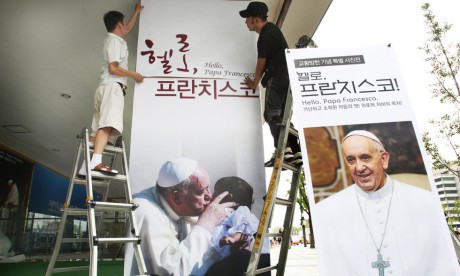(RNS) Pope Francis departs next week (Aug. 14) on a five-day trip to South Korea, his first to Asia and the start of an important new papal focus on the region.
In January, Francis will return to visit Sri Lanka and the Philippines, and a trip to Japan — where the pope wanted to go as a young priest — is reportedly under consideration.
“I must go to Asia,” the pope said a year ago as he returned from a visit to Brazil, adding that his predecessor, Benedict XVI, never traveled there during his eight-year pontificate.
Now Francis will get his chance, and Asians will have their first opportunity to see their new pope up close.
But more than evangelizing missions or personal pilgrimages, the Asian trips also highlight Francis’ push to globalize and reform a Catholic Church that is still very much centered on what happens in Rome, and anchored in a European mindset that is accustomed to the privileges of a majority status and often preoccupied with matters of doctrine and ecclesiastical politics.
Asian Catholicism, by contrast, is younger, less rooted in the surrounding culture and less interested in looking to the Vatican for answers to every question.
While 130 million Asian Catholics represent only 11 percent of all Catholics worldwide, the church in Asia is growing faster than any place else except Africa, and almost half the population of Asia is under 25.
In fact, Francis is going to South Korea to take part in Asian Youth Day, a Catholic jamboree that will draw young people from 29 Asian countries.
Asian churches also benefit by being so distant from the Vatican, and from the internecine concerns of the Roman Curia.
For example, bishops in Asia are often freer to tell Rome when they disagree with certain policies or decisions and they have a better chance of Rome letting them do their own thing — a dynamic of decentralization that Francis says he wants to encourage. Continue reading
Sources
